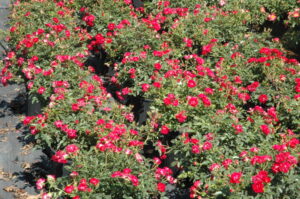S & J Nursery Red Drift Rose
/ Rosa ‘Meigalpio’
Red Drift Rose Origins:
– Well Conard Pyle seems to have done it again! The people who brought us the Knockout family of roses has introduced an easy care, disease resistant selection of groundcover roses that are not only well mannered in the garden but fit in just about anywhere. Whether your filling in a gap in the
perennial border or want some extra curb appeal on the front of the foundation plantings at your home or office or just have a container by the door or patio area you want some low maintenance color in, Drift roses are the perfect fit for your gardens needs. Its no wonder these pretty little Roses are popping up everywhere from subdivision entry ways to parking lots and even hillsides, they just keep on blooming ( setting buds every 5-6
weeks from spring until frost to be more precise) with very little help from us along the way. What more could you ask for? More colors? They’ve got that covered to!!!
Red Drift Rose Preferred Exposure:
– Drift Roses will prefer a full sun location or a minimum of 6-8 hours of direct sun a day in our North Florida | Jacksonville| St. Augustine area landscapes to perform at their best.
Red Drift Rose Soil Preference / Salt tolerance:
– Plant Red Drift Roses in North Florida in just about any well draining soil. Add a healthy shovel full of compost or cow manure to the planting hole when you dig and you’ll love the extra help it gives you as you establish the rose in your gardens landscape.
Red Drift Rose Size Variance:
– Drift Roses are compact spreaders only reaching 1 -2 ft in height and
a fair bit wider than they are tall spreading to 2-3 ft easily.
Red Drift Rose Growth Habit:
– Well its name kind of gives it away doesn’t it? Although Drift Roses have a
rounded compact habit they are considered a spreading groundcover rose, they just drift right along blooming as they go!
Red Drift Rose Growth Rate:
– Extremely quick to establish itself in the landscape and reaches mature size within its first growing season when planted from a 3 gallon size nursery container.
Red Drift Rose Bloom:
– The Red Drift Rose has small 3/4 inch red blooms in abundance throughout
the year. Don’t let the internet photos fool you , these roses are red, with no painting required… Ok, I promise no more Alice in Wonderland jokes.
Red Drift Rose Water Requirements:
– Water daily to establish into the landscape and use supplemental irrigation twice a week after that for best results in the landscape when not receiving regular rainfall.
Best Uses For Red Drift Rose:
– Excellent when planted as a single specimen in a perennial border or when planted in masses for maximum landscape curb appeal.
– Drift Roses also make great container plants, try a Drift Rose
for planters at the entryway of your home or next to the back porch or patio for an easy care long blooming accent that will gently cascade over the sides of the container.
– These miniature rose bushes are also great Groundcovers for sloped
hillsides and embankments and are a sure bet to brighten up anyplace they are planted with an abundance of blooms.
Care of Red Drift Rose:
– Drift roses should be pruned back to just 6 inches each spring before growth begins for the best results.
– Although by no means is it necessary, regular dead heading encourages a fast rebloom and helps maintain a healthy and tidy appearance to a Drift Roses gently meandering nature. I like to give them a bit of rose food each time I trim for a little extra TLC.
– Water every day during the establishment period. See watering your newly planted items for more information.
– They will need good water during the establishment period and bi-weekly
supplemental irrigation particularly in periods of low local rainfall.
– Add compost or cow manure yearly as a surface treatment pulling back the mulch and spreading it around under the foliage of the plant on top of the existing soil. don’t forget to re-mulch around the plants to help them stay cool and help them to retain moisture in our hot sunny North Florida gardens.
– Plants respond well to a mixture of rose food and Milorganite each spring and again in mid summer, sprinkling the fertilizer around the mulch circle underneath the foliage of the plant.

